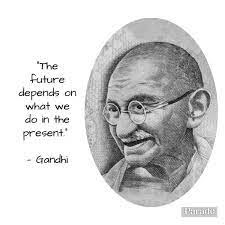Search This Blog
This is the place to go if you want to learn intriguing details about the most outstanding people in the world. Using a detailed expert study that reveals their interests, way of life, driving forces, and difficulties. Stay with us to get the most recent news on those who have had better success in the world.
Featured
- Get link
- X
- Other Apps
Mahatma Gandhi
Mahatma Gandhi
"The best way to find yourself is to lose yourself in the service of others"
Mohandas Karamchand Gandhi, also known as Mahatma Gandhi, was a prominent Indian nationalist leader and social reformer who played a crucial role in India's struggle for independence from British rule. Born on October 2, 1869, in Porbandar, Gujarat, India, Gandhi spent most of his adult life fighting for social justice and equality through nonviolent means.
Early
Life and Education
Gandhi attended high school in Rajkot and later studied law
at University College London. He struggled to adapt to life in London and faced
racism and discrimination, which he later wrote about in his autobiography, The
Story of My Experiments with Truth.
Early
Career in South Africa
After completing his law studies, Gandhi returned to India but struggled to establish a successful law practice. In 1893, he accepted a one-year contract to work as a legal advisor in South Africa, where he encountered racial discrimination firsthand. Gandhi was thrown off a train for refusing to give up his first-class seat and was subjected to other forms of harassment and violence.
These experiences led Gandhi to become involved in the Indian community's struggle for civil rights in South Africa. He organized protests, initiated a campaign of civil disobedience, and coined the term satyagraha to describe his philosophy of nonviolent resistance. Gandhi believed that by refusing to cooperate with unjust laws and institutions, individuals could bring about social and political change.
Return to India and the Independence Movement
In 1915, Gandhi returned to India and became involved in the
Indian nationalist movement, which was working to end British rule in India. He
quickly emerged as a prominent leader of the movement and began organizing
protests and boycotts of British goods and institutions. Gandhi's philosophy of
nonviolent resistance became a central tenet of the movement, and he encouraged
Indians to resist British rule through peaceful means.
Gandhi's activism and leadership came to a head in 1930 when
he led the Salt March, a protest against the British salt tax. The march, which
began on March 12, 1930, and ended on April 6, covered a distance of 240 miles
and attracted widespread attention both in India and around the world. The Salt
March marked a turning point in the Indian independence movement and inspired
similar nonviolent protests and campaigns around the world.
Gandhi's
Leadership and Philosophy
Gandhi's philosophy of nonviolent resistance or satyagraha
was central to his leadership and activism. He believed that violence only
begets violence and that individuals could bring about social and political
change through peaceful means. Gandhi encouraged Indians to resist British rule
through civil disobedience, boycotts, and other nonviolent means.
Gandhi also emphasized the importance of self-discipline and
self-reliance. He encouraged Indians to take responsibility for their own lives
and to work together to build a better future for their country. Gandhi
believed that all individuals had the potential to be agents of change and that
nonviolence was the most effective means of bringing about social and political
transformation.
Gandhi was never ahead of state or government, but instead, the head of a private organization – the Indian National Congress, that, along with its many partners, mobilized an incredibly diverse and complex people into a united movement against British imperialism. He led first and foremost by understanding the diversity of India and its people – economically, culturally, and religiously, and deeply integrating that diversity into the Independence movement. He further integrated himself into the movement by dedicating his life to the cause, living as much among the people as possible, and risking death many times for the cause. While there may never be another Gandhi, there is no reason that today’s committed social entrepreneurs can’t embrace their version of Gandhi’s personal and political leadership commitment.
Gandhi’s greatest leadership trait was his ability to visualize the qualities of a successful, post-Independence Indian nation, and maintain a lifelong focus on the four intertwined challenges that he believed must be collectively addressed for India to achieve success as a nation.
to free India from British occupation, to end untouchability, to improve relations between Hindus and Muslims, and to make India into a self-reliant nation – economically and socially. Gandhi aligned most of the social movements he led around these four goals – starting with his work in South Africa and continuing until his death.
Gandhi's
Legacy
Gandhi's leadership and philosophy had a significant impact on Indian society and on the world at large. His advocacy of nonviolence and civil disobedience inspired many other social justice movements around the world, including the American civil rights movement led by Martin Luther King Jr. Gandhi's legacy continues to influence Indian politics and society.

- Get link
- X
- Other Apps







Comments
Post a Comment